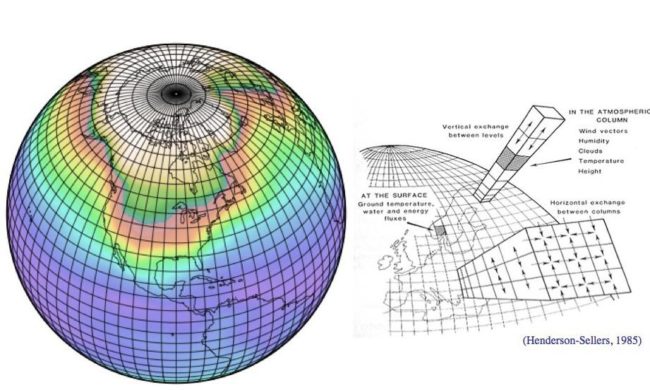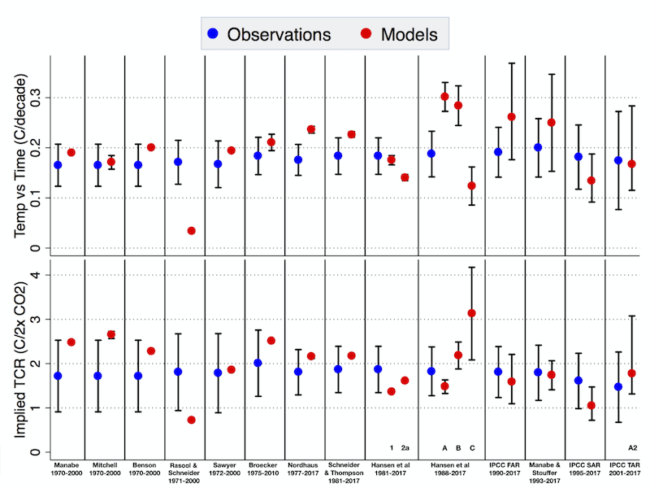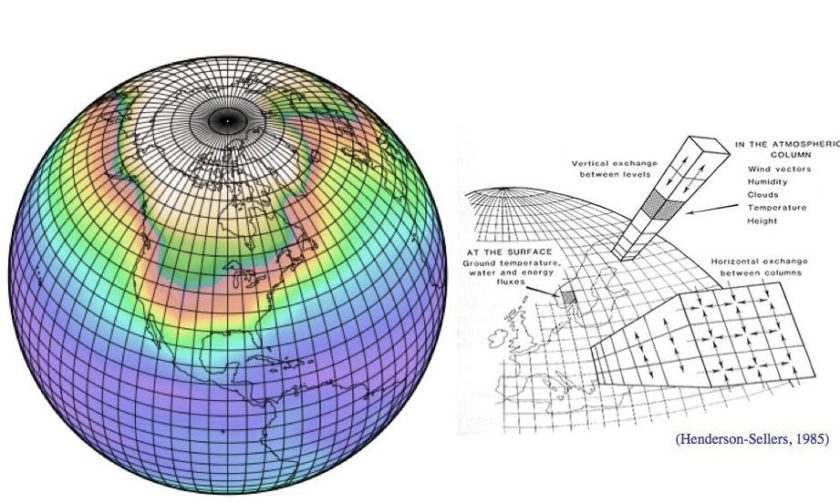
If you embraced the view of the climate denialist community then your claim might be that the climate models are not very good at all and have been proven to be highly inaccurate. This is a testable claim, hence you should be able to either cite some credible analysis, or do the work.
Climate models that predict warming have been with us since the 1970s, so all you would need to do is to gather up data from almost half a century of predictions and then compare all of that to the actual observations.
There is a new comprehensive study that has done exactly this. What did they discover?
Let’s take a look.
Evaluating the performance of past climate model projections
The new study was published within Geophysical research papers on December 4th 2019. The researchers compare projections from models going back to the 1970’s and compares these outputs to the actual observations. What this delivers is a robust and independent test of model skill.
Gavin Schmidt, one of the authors, explains what is new here within a posting he made about it all …
Zeke Hausfather, Henri Drake, Tristan Abbott and I took a look at how well climate models have actually been able to accurately project warming in the years after they were published. This is an extension of the comparisons we have been making on RealClimate for many years, but with a broader scope and a deeper analysis. We gathered all the climate models published between 1970 and the mid-2000s that gave projections of both future warming and future concentrations of CO2 and other climate forcings – from Manabe (1970) and Mitchell (1970) through to CMIP3 in IPCC 2007
What did they find?
Did they discover that the anti-science denialists have been right all along?
Nope, this is what they found …
We found that climate models – even those published back in the 1970s – did remarkably well, with 14 out of the 17 projections statistically indistinguishable from what actually occurred.
Here is an illustration from the paper …

It gets complicated
When modelling you have to make assumptions. For example how society responds will lead to an assumption regarding the amount of CO2 within our atmosphere at future dates.
Handling this correctly does matter when doing an evaluation such as this one.
Gavin explains it like this …
We evaluated these models both on how well modeled warming compared with observed warming after models were published, and how well the relationship between warming and CO2 (and other climate forcings) in models compares to observations (the implied transient climate response) …. The second approach is important because even if an old model had gotten all the physics right, the future projected warming would be off if they assumed we would have 450 ppm CO2 in 2020 (which some did!).
Other Results
It turns out that some stuff that initially looked way off the mark was actually right …
There are a few other results that stand out, notably the (infamous?) low sensitivity result in Rasool and Schneider (1971), which was mainly due to a lack of stratospheric adjustment and water vapor short wave absorption in their formulation. This was noted by Schneider (1975) and the calculation redone by Schneider and Thompson (1981) which turned out to be far more accurate.
Climate Models Study Conclusions
From the paper itself (the emphases in bold is my addition)…
In general, past climate model projections evaluated in this analysis were skillful in predicting subsequent GMST warming in the years after publication. While some models showed too much warming and a few showed too little, most models examined showed warming consistent with observations, particularly when mismatches between projected and observationally-informed estimates of forcing were taken into account. We find no evidence that the climate models evaluated in this paper have systematically overestimated or underestimated warming over their projection period. The projection skill of the 1970s models is particularly impressive given the limited observational evidence of warming at the time….
…While climate models have grown substantially more complex than the early models examined here, the skill that early models have shown in successfully projecting future warming suggests that climate models are effectively capturing the processes driving the multi-decadal evolution of GMST.[global mean surface temperature]…
Final Thought
How accurate are climate models?
Very.
That matters. Not because it proves a point, but because of what these same models tell us is coming
Climate Models Study – Further Reading
- Geophysical research papers (4th December 2019) – Evaluating the performance of past climate model projections
There is a paywall there (oh joy!). Worry not, you can grab a non-paywalled copy from the NASA website here …
- Non-Paywalled version
- All the data and code for this study are available here.
One of the study authors writes about it all in detail on the RealClimate blog here …
There are of course, quite rightly, media stories on this latest study as well …
- Vox – Scientists have gotten predictions of global warming right since the 1970s
- Guardian – Climate models have accurately predicted global heating, study finds
- Washington Post – The simplest of climate models run decades ago accurately projected global warming
- etc…
Climate Models Study – Tweets
The lead author has been tweeting all the details. It is well worth checking out this thread …
